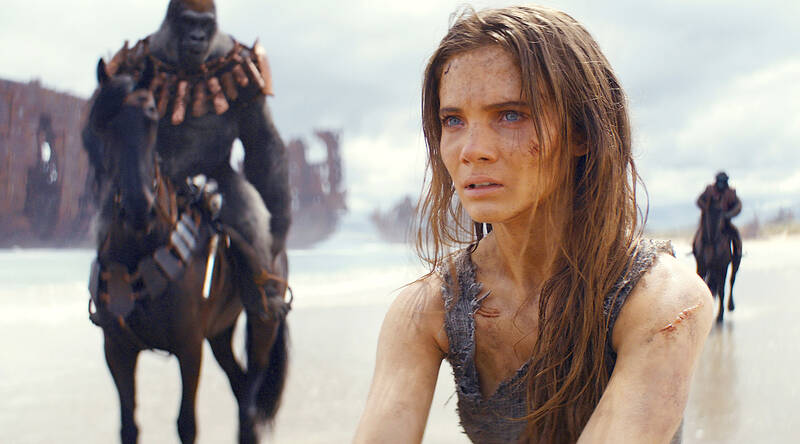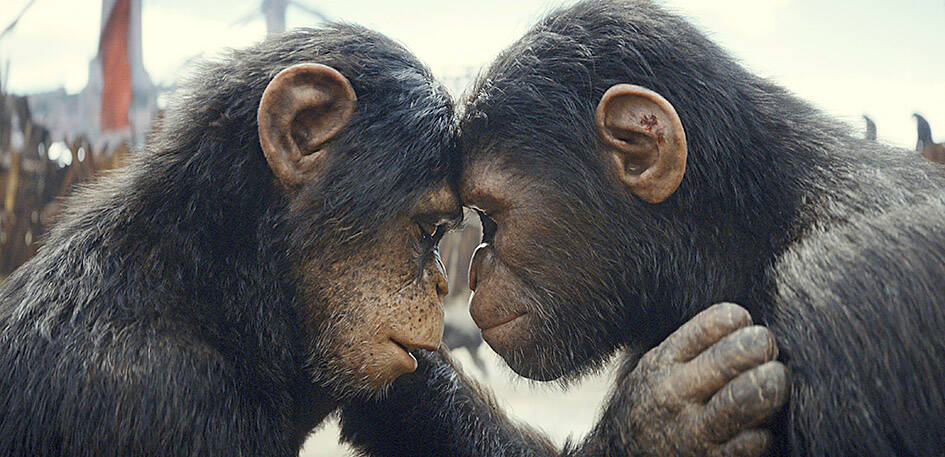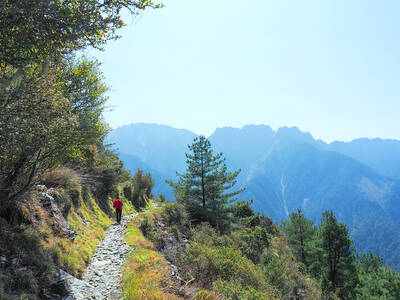Fans of the Planet of the Apes franchise may still be mourning the 2017 death of Caesar, the first smart chimp and the charismatic ape leader. Not to worry: He haunts the next episode, the thrilling, visually stunning Kingdom of the Planet of the Apes.
We actually start with Caesar’s funeral, his body decorated with flowers and then set alight like a Viking, before fast-forwarding “many generations later.” All apes talk now and most humans don’t, reduced to caveman loin cloths and running wide-eyed and scared, evolution in reverse.
Our new hero is the young ape Noa (Owen Teague ) who is like all young adult chimps — seeking his father’s approval (even chimp dads just don’t understand) and testing his bravery. He is part of a clan that raises pet eagles, smokes fish and lives peacefully.

Photo: AP
That all changes when his village is attacked not by humans but by fellow apes — masked soldiers from a nasty kingdom led by the crown-wearing Proximus Caesar (Kevin Durand, playing it to the hilt). He has taken Caesar’s name but twisted his words to become a tyrannical strongman — sorry, strongape.
Unlike the last movie which dealt with man’s inhumanity to animals — concentration camps included — ape-on-ape violence is in the cards for this one, including capturing an entire clan as prisoners. Proximus Caesar’s goons use makeshift cattle prods on fellow apes and force them to work while declaring “For Caesar!”
Screenwriter Josh Friedman has cleverly created a movie that examines how ancient stories can be hijacked and manipulated, like how Caesar’s non-violent message gets twisted by bad actors. There’s also a lot of Avatar primitive naivete, and that makes sense since the reboot was shaped by several of that blue alien movie’s makers.

Photo: AP
The movie poses some uncomfortable questions about collaborationists. William H Macy plays a human who has become a sort of teacher-prisoner to Proximus Caesar — reading Kurt Vonnegut to him — and won’t fight back. “It is already their world,” he rationalizes.
Along for the heroic ride is a human young woman (Freya Allan, a budding star) who is hiding an agenda but offers Noa help along the way. Peter Macon plays a kindly, book-loving orangutan who adds a jolt of gleeful electricity to the movie and is missed when he goes.
The effects are just jaw-dropping, from the ability to see individual hairs on the back of a monkey to the way leaves fall and the crack of tree limbs echoing in the forest. The sight of apes on horseback, which seemed glitchy just seven years ago, are now seamless. There are also inside jokes, like the use of the name Nova again this time.
Director Wes Ball nicely handles all the thrilling sequences — though the two-and-a-half hour runtime is somewhat taxing — and some really cool ones, like the sight of apes on horseback on a beach, a nod to the original 1968 movie. And like when the apes look through some old illustrated kids’ books and see themselves depicted in zoo cages. That makes for some awkward human-ape interaction. “What is next for apes? Should we go back to silence?” our hero asks.
The movie races to a complex face-off between good and bad apes and good and bad humans outside a hulking silo that holds promise to each group. Can apes and humans live in peace, as Caesar hoped? Kingdom of the Planet of the Apes doesn’t answer that but it does open up plenty more to ponder. Starting with the potentially crippling proposition of a key death, this franchise has somehow found new vibrancy.

“Why does Taiwan identity decline?”a group of researchers lead by University of Nevada political scientist Austin Wang (王宏恩) asked in a recent paper. After all, it is not difficult to explain the rise in Taiwanese identity after the early 1990s. But no model predicted its decline during the 2016-2018 period, they say. After testing various alternative explanations, Wang et al argue that the fall-off in Taiwanese identity during that period is related to voter hedging based on the performance of the Democratic Progressive Party (DPP). Since the DPP is perceived as the guardian of Taiwan identity, when it performs well,

The Taiwan People’s Party (TPP) on May 18 held a rally in Taichung to mark the anniversary of President William Lai’s (賴清德) inauguration on May 20. The title of the rally could be loosely translated to “May 18 recall fraudulent goods” (518退貨ㄌㄨㄚˋ!). Unlike in English, where the terms are the same, “recall” (退貨) in this context refers to product recalls due to damaged, defective or fraudulent merchandise, not the political recalls (罷免) currently dominating the headlines. I attended the rally to determine if the impression was correct that the TPP under party Chairman Huang Kuo-Chang (黃國昌) had little of a

At Computex 2025, Nvidia CEO Jensen Huang (黃仁勳) urged the government to subsidize AI. “All schools in Taiwan must integrate AI into their curricula,” he declared. A few months earlier, he said, “If I were a student today, I’d immediately start using tools like ChatGPT, Gemini Pro and Grok to learn, write and accelerate my thinking.” Huang sees the AI-bullet train leaving the station. And as one of its drivers, he’s worried about youth not getting on board — bad for their careers, and bad for his workforce. As a semiconductor supply-chain powerhouse and AI hub wannabe, Taiwan is seeing

Jade Mountain (玉山) — Taiwan’s highest peak — is the ultimate goal for those attempting a through-hike of the Mountains to Sea National Greenway (山海圳國家綠道), and that’s precisely where we’re headed in this final installment of a quartet of articles covering the Greenway. Picking up the trail at the Tsou tribal villages of Dabang and Tefuye, it’s worth stocking up on provisions before setting off, since — aside from the scant offerings available on the mountain’s Dongpu Lodge (東埔山莊) and Paiyun Lodge’s (排雲山莊) meal service — there’s nowhere to get food from here on out. TEFUYE HISTORIC TRAIL The journey recommences with